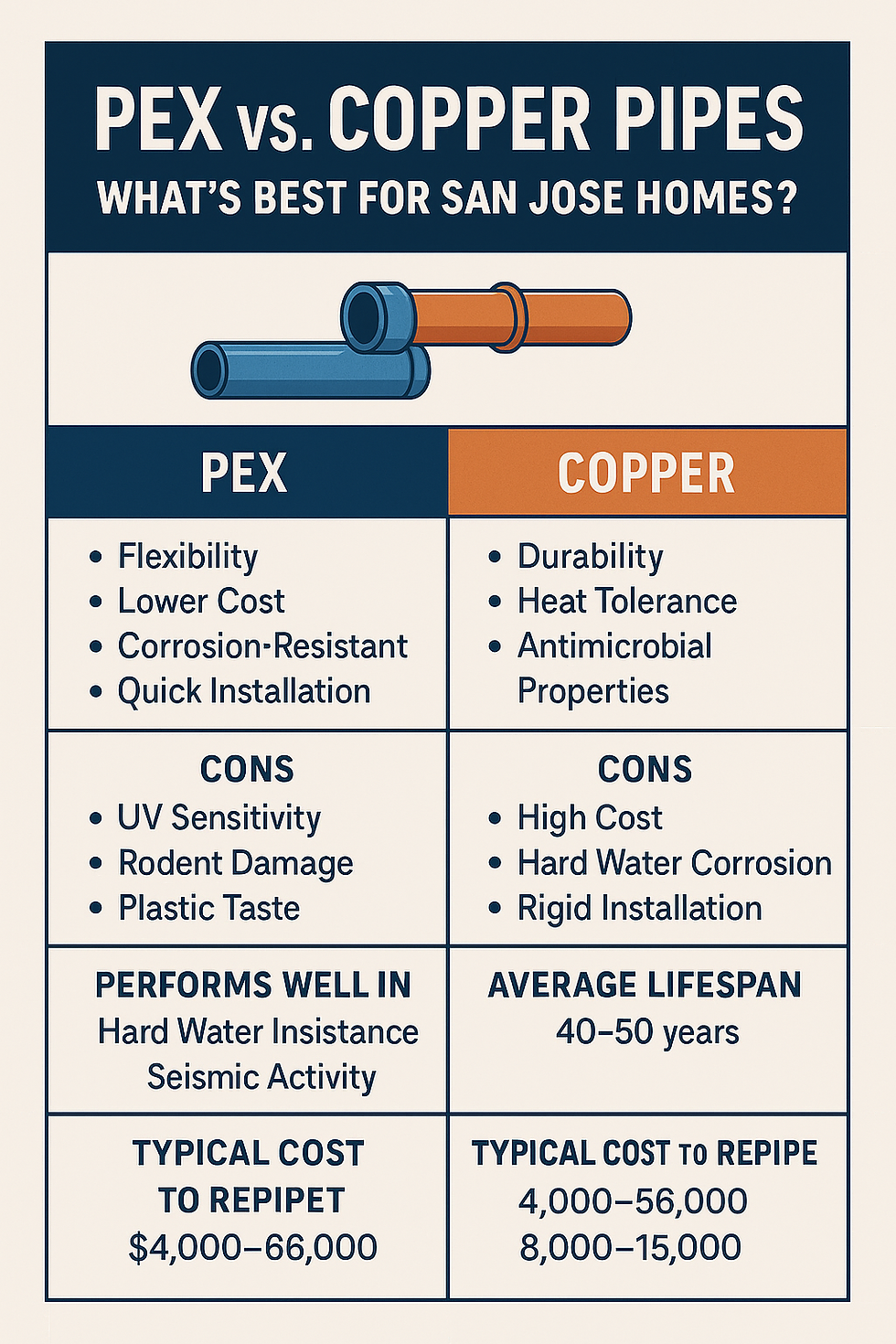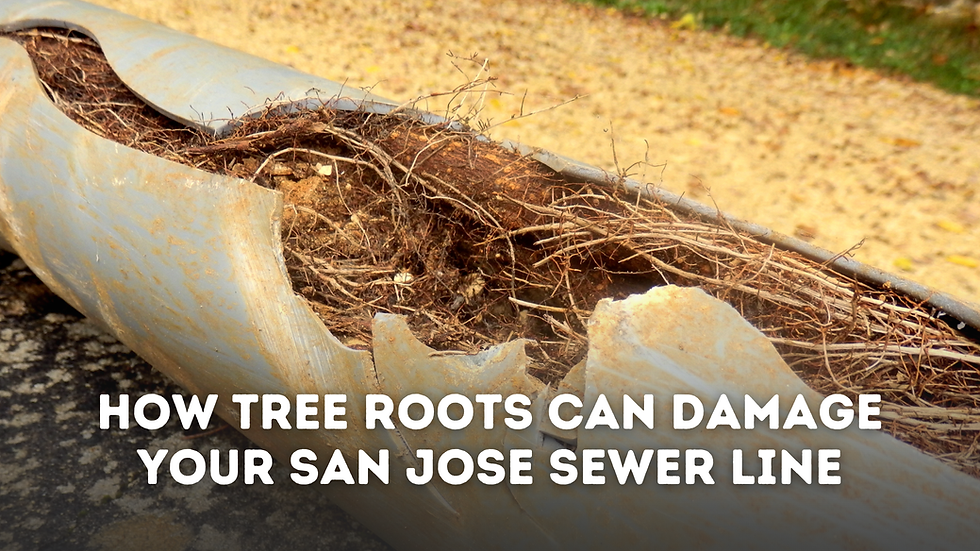PEX vs. Copper Pipes: What’s Best for San Jose Homes?
- Local R&P

- Jul 18, 2025
- 5 min read
When it comes to repiping or upgrading your plumbing system in San Jose, one of the most important decisions you'll face is choosing between PEX (cross-linked polyethylene) and copper pipes. Both materials are widely used and accepted by building codes, but they offer different benefits depending on your home’s age, local water quality, and budget.
In this article, we’ll break down the pros and cons of PEX and copper piping, evaluate their performance in San Jose’s climate and water conditions, and help you determine which is best for your home improvement or renovation project.

Why Your Pipe Choice Matters in San Jose
San Jose homes vary from early 20th-century bungalows to sleek, modern smart homes. Older properties often have galvanized steel or copper plumbing, which eventually corrode, leak, or clog. Choosing the right replacement piping material can:
Improve water pressure and flow
Prevent leaks and water damage
Increase energy efficiency
Add value to your home
San Jose’s hard water, seismic activity, and mild Mediterranean climate also influence how each pipe type performs long-term.
What Is PEX?

PEX stands for cross-linked polyethylene—a flexible, durable plastic pipe used in residential and commercial plumbing systems. It’s been widely used in the U.S. since the 1990s and is now the most popular material for repiping.
Benefits of PEX:
Flexibility: Can bend around corners and requires fewer joints
Lower Cost: Typically 30–50% cheaper than copper
Corrosion-Resistant: Doesn’t corrode from hard water or chemical exposure
Quick Installation: Easier and faster for plumbers to work with
Freeze Resistance: More tolerant to pipe expansion in cold temperatures
Potential Drawbacks:
UV Sensitivity: Cannot be used outdoors or exposed to direct sunlight
Rodent Damage: Some homeowners report rodents chewing through PEX
Plastic Taste: In some cases, PEX can affect water taste when newly installed
Not Recyclable: Unlike copper, PEX can’t be melted down and reused
What Is Copper Piping?

Copper pipes have been the plumbing standard for over 70 years. They are strong, non-toxic, and provide a long-lasting solution when properly installed.
Benefits of Copper:
Durability: Can last 50+ years with proper maintenance
Heat Tolerance: Excellent for hot water lines
Antimicrobial Properties: Inhibits bacteria growth in water lines
Recyclable: Copper retains value and can be reused
Fire Resistant: Will not burn or release toxic fumes
Potential Drawbacks:
High Cost: Copper prices fluctuate and can be expensive
Hard Water Corrosion: San Jose’s hard water can pit or erode copper over time
Rigid Installation: Requires more fittings and labor than PEX
Noise: Tends to make “water hammer” noises due to lack of flexibility
PEX vs. Copper: Side-by-Side Comparison
Feature | PEX | Copper |
Flexibility | Highly flexible | Rigid |
Installation Cost | Lower (30–50% less) | Higher due to labor/material cost |
Durability | 40–50 years | 50+ years |
Corrosion Resistance | Excellent (no corrosion) | Can corrode in hard/acidic water |
Water Quality | May alter taste slightly | No impact |
UV Resistance | Poor (indoor use only) | Excellent |
Recyclability | Not recyclable | Fully recyclable |
Freeze Tolerance | Good (expands slightly) | Poor (may burst if frozen) |
Ideal Use Cases | Interior repiping, remodels | Outdoor plumbing, hot water lines |
How Each Performs in San Jose Conditions
1. Water Quality
San Jose is known for having hard water due to mineral content. Over time, these minerals can corrode copper pipes—leading to pinhole leaks and reduced pipe lifespan.
PEX Advantage: Completely resistant to hard water corrosion.
2. Seismic Activity
California is in an earthquake zone, including San Jose. Plumbing must withstand ground movement and shifting foundations.
PEX Advantage: Its flexibility allows it to absorb seismic shocks better than rigid copper.
3. Climate
While San Jose enjoys mild winters, occasional cold snaps can still pose a risk.
PEX Advantage: It expands slightly, making it more resistant to freezing and bursting.
4. Remodeling & Retrofits
Older San Jose homes often require retrofits in tight spaces, where existing framing limits access.
PEX Advantage: Easier to install in tight spaces due to flexibility and push-fit connectors.
Cost Breakdown: PEX vs. Copper in San Jose
Item | PEX | Copper |
Materials (per linear foot) | $0.40 – $0.75 | $2.00 – $4.00 |
Installation (per home) | $4,000 – $6,000 | $8,000 – $15,000 |
Time to Install | 2–3 days | 4–7 days |
Maintenance Costs | Low | Moderate |
Tip: The final price depends on the number of bathrooms, home layout, and labor costs.
When to Choose PEX for Your San Jose Home
PEX is ideal for most homeowners in the Bay Area looking for a budget-friendly, efficient, and modern piping system. Consider PEX if:
You're repiping an older home
You want a faster, less invasive installation
You're concerned about San Jose’s hard water
You’re doing major renovations or adding plumbing lines
You're on a tight budget
When to Choose Copper for Your San Jose Home
Copper may still be the better choice in certain scenarios. Choose copper piping if:
You’re upgrading a high-end or historic home
You want a time-tested material with resale appeal
Your plumbing is exposed to sunlight or outdoors
You plan to recycle or resell old materials
You're installing lines that must meet strict fire codes

Local Code Considerations in San Jose
Both PEX and copper are approved under California Plumbing Code. However, San Jose building inspectors may require:
Permits for repiping
Pressure tests for new installations
Lead-free materials per NSF/ANSI 61 standards
Always hire a licensed and bonded plumber familiar with San Jose's city permits and code compliance.
Environmental Impact: Which Is Greener?
PEX uses fewer natural resources during manufacturing but is not recyclable.
Copper requires mining and high energy to produce, but it is 100% recyclable.
Verdict: If you value sustainability, copper may have the edge—especially if you recycle old pipes after replacement.
Frequently Asked Questions (FAQs)
Q: Can I mix PEX and copper pipes?
Yes, plumbers can use special fittings (such as SharkBite or crimp connectors) to join PEX and copper safely.
Q: Does PEX affect water quality?
PEX may give a slight plastic taste to water initially, but this fades over time. It meets all safety standards for potable water.
Q: Is PEX safe for hot water lines?
Yes. PEX is rated for up to 200°F, making it suitable for both cold and hot water systems.
Conclusion: What’s Best for San Jose Homes?
For most modern homes and repiping projects in San Jose, PEX offers the best balance of durability, affordability, and performance. Its resistance to corrosion and seismic adaptability makes it especially well-suited to local conditions.
However, copper remains a top choice for outdoor use, resale value, and long-term durability in premium projects.
Whichever you choose, ensure your plumber is licensed, experienced with Bay Area installations, and uses high-quality materials that meet California code standards.

Need Help Choosing Between PEX and Copper?
Call Local Rooter Corp – San Jose's Trusted Plumbing Experts – at 408-868-8759 for a free estimate. We’ll inspect your system, explain your options, and provide expert recommendations based on your budget and goals.




Comments